2023年高考英语二轮专题复习:代词(1) 课件(24张PPT)
文档属性
| 名称 | 2023年高考英语二轮专题复习:代词(1) 课件(24张PPT) |  | |
| 格式 | pptx | ||
| 文件大小 | 347.3KB | ||
| 资源类型 | 教案 | ||
| 版本资源 | 通用版 | ||
| 科目 | 英语 | ||
| 更新时间 | 2022-10-27 14:48:04 | ||
图片预览


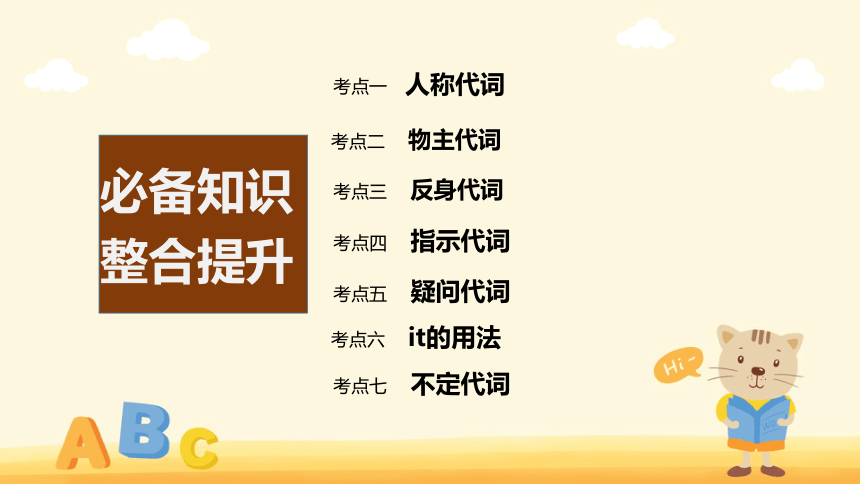
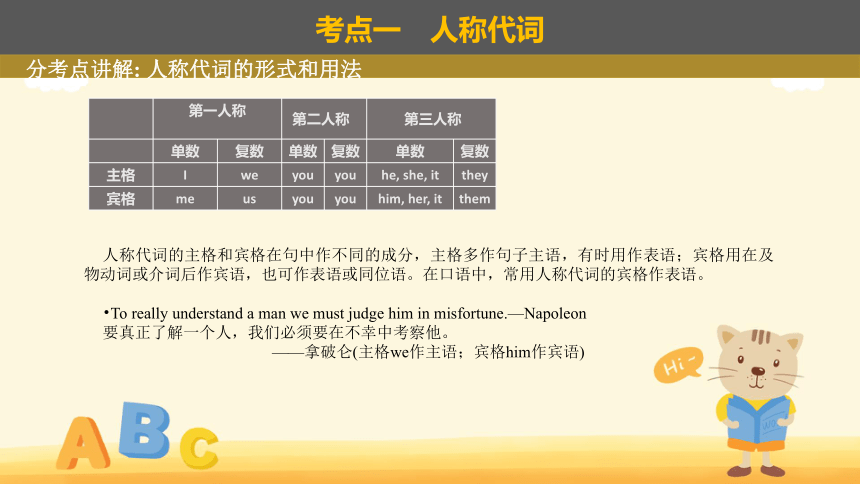
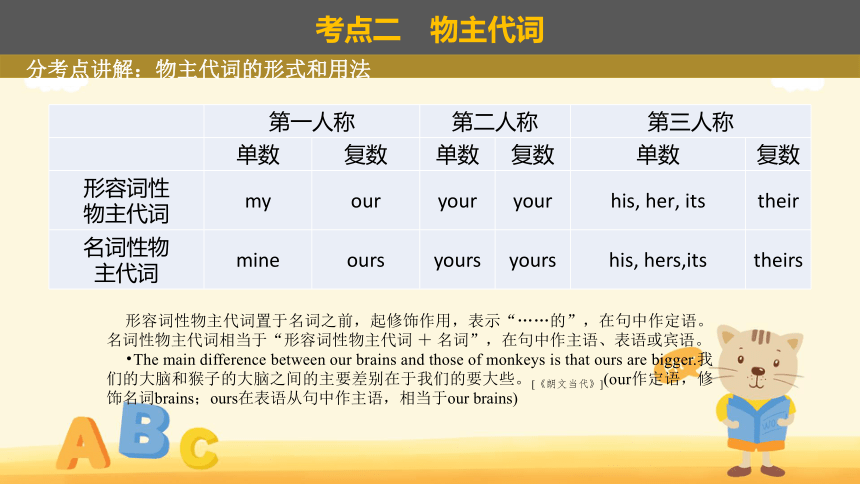
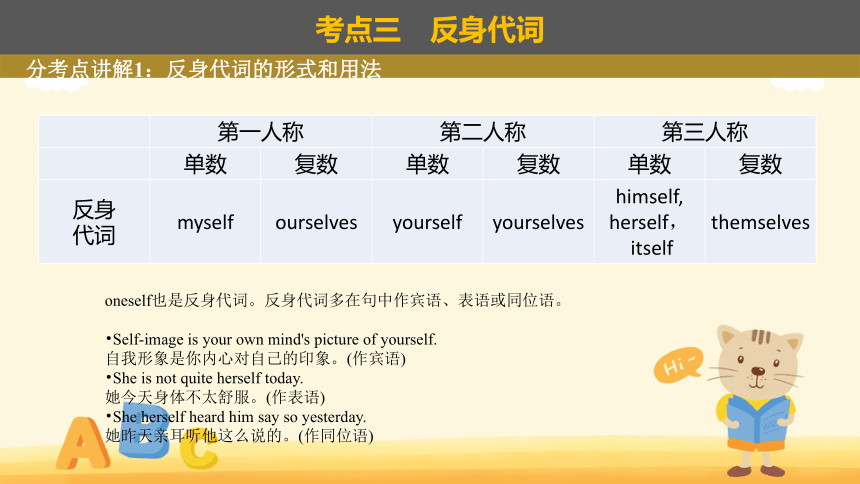
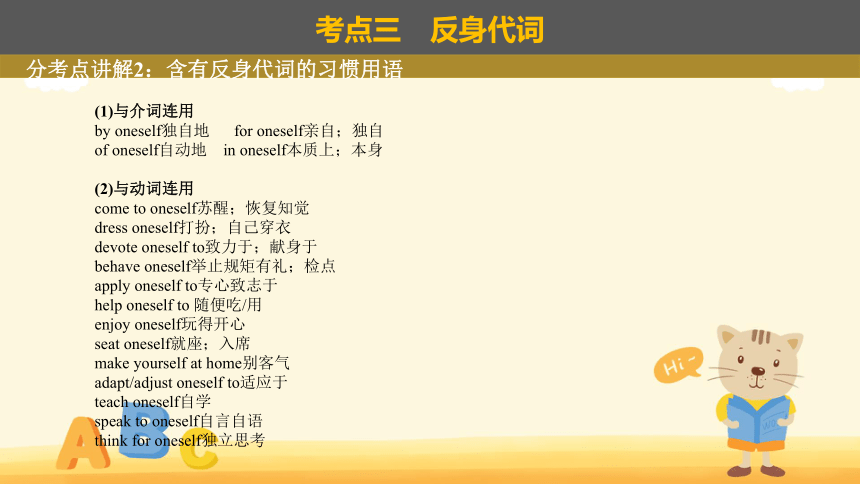
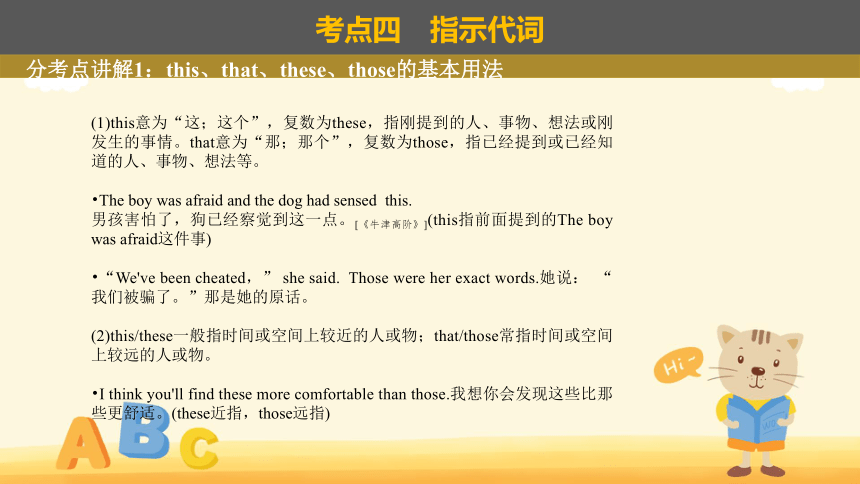
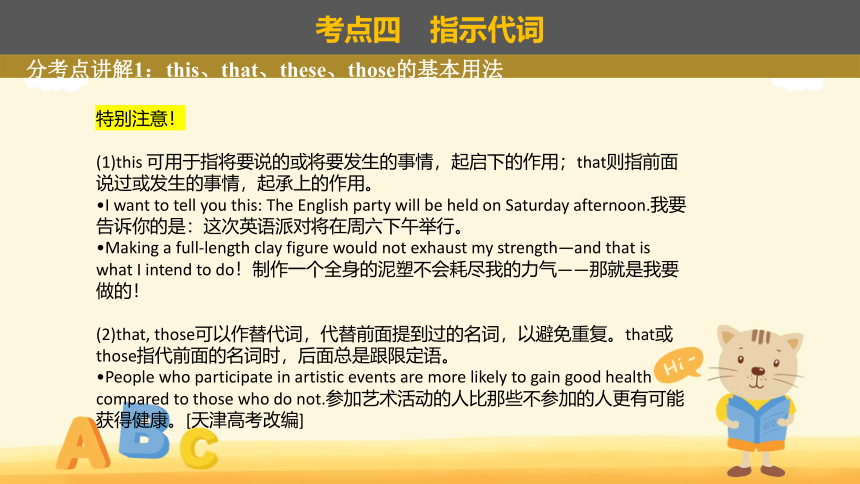
文档简介
(共24张PPT)
专题二 代词
第1讲 代词讲解(1)
必备知识 整合提升
核心考法 重难突破
易混知识 易错清单
代词
强化模拟 限时训练
必备知识
整合提升
考点一 人称代词
考点二 物主代词
考点三 反身代词
考点四 指示代词
考点五 疑问代词
考点六 it的用法
考点七 不定代词
考点一 人称代词
分考点讲解: 人称代词的形式和用法
第一人称 第二人称 第三人称
单数 复数 单数 复数 单数 复数
主格 I we you you he, she, it they
宾格 me us you you him, her, it them
人称代词的主格和宾格在句中作不同的成分,主格多作句子主语,有时用作表语;宾格用在及物动词或介词后作宾语,也可作表语或同位语。在口语中,常用人称代词的宾格作表语。
To really understand a man we must judge him in misfortune.—Napoleon
要真正了解一个人,我们必须要在不幸中考察他。
——拿破仑(主格we作主语;宾格him作宾语)
考点二 物主代词
分考点讲解:物主代词的形式和用法
第一人称 第二人称 第三人称
单数 复数 单数 复数 单数 复数
形容词性 物主代词 my our your your his, her, its their
名词性物 主代词 mine ours yours yours his, hers,its theirs
形容词性物主代词置于名词之前,起修饰作用,表示“……的”,在句中作定语。名词性物主代词相当于“形容词性物主代词 + 名词”,在句中作主语、表语或宾语。
The main difference between our brains and those of monkeys is that ours are bigger.我们的大脑和猴子的大脑之间的主要差别在于我们的要大些。[《朗文当代》](our作定语,修饰名词brains;ours在表语从句中作主语,相当于our brains)
考点三 反身代词
分考点讲解1:反身代词的形式和用法
第一人称 第二人称 第三人称
单数 复数 单数 复数 单数 复数
反身 代词 myself ourselves yourself yourselves himself, herself, itself themselves
oneself也是反身代词。反身代词多在句中作宾语、表语或同位语。
Self image is your own mind's picture of yourself.
自我形象是你内心对自己的印象。(作宾语)
She is not quite herself today.
她今天身体不太舒服。(作表语)
She herself heard him say so yesterday.
她昨天亲耳听他这么说的。(作同位语)
考点三 反身代词
分考点讲解2:含有反身代词的习惯用语
(1)与介词连用
by oneself独自地 for oneself亲自;独自
of oneself自动地 in oneself本质上;本身
(2)与动词连用
come to oneself苏醒;恢复知觉
dress oneself打扮;自己穿衣
devote oneself to致力于;献身于
behave oneself举止规矩有礼;检点
apply oneself to专心致志于
help oneself to 随便吃/用
enjoy oneself玩得开心
seat oneself就座;入席
make yourself at home别客气
adapt/adjust oneself to适应于
teach oneself自学
speak to oneself自言自语
think for oneself独立思考
考点四 指示代词
分考点讲解1:this、that、these、those的基本用法
(1)this意为“这;这个”,复数为these,指刚提到的人、事物、想法或刚发生的事情。that意为“那;那个”,复数为those,指已经提到或已经知道的人、事物、想法等。
The boy was afraid and the dog had sensed this.
男孩害怕了,狗已经察觉到这一点。[《牛津高阶》](this指前面提到的The boy was afraid这件事)
“We've been cheated,” she said. Those were her exact words.她说: “我们被骗了。”那是她的原话。
(2)this/these一般指时间或空间上较近的人或物;that/those常指时间或空间上较远的人或物。
I think you'll find these more comfortable than those.我想你会发现这些比那些更舒适。(these近指,those远指)
考点四 指示代词
分考点讲解1:this、that、these、those的基本用法
特别注意!
(1)this 可用于指将要说的或将要发生的事情,起启下的作用;that则指前面说过或发生的事情,起承上的作用。
I want to tell you this: The English party will be held on Saturday afternoon.我要告诉你的是:这次英语派对将在周六下午举行。
Making a full length clay figure would not exhaust my strength—and that is what I intend to do!制作一个全身的泥塑不会耗尽我的力气——那就是我要做的!
(2)that, those可以作替代词,代替前面提到过的名词,以避免重复。that或those指代前面的名词时,后面总是跟限定语。
People who participate in artistic events are more likely to gain good health compared to those who do not.参加艺术活动的人比那些不参加的人更有可能获得健康。[天津高考改编]
考点四 指示代词
分考点讲解2:such的用法
such意为“上述一类;诸如此类;这种;这类”,指代前面所叙述的人或事物,在句中作主语、宾语、表语或定语。such作主语时,谓语动词的单复数取决于其后的名词的数。
In such a situation, I work as hard as I can—then let the leader take over.在这种情况下,我会尽最大努力工作——然后便交由领导处理。
Such are my friends who will never fail to help me when needed.我的朋友们就是这样:永远会在我需要他们时伸出援手。
考点四 指示代词
分考点讲解3:so的用法
(1)意为“如此;这样”,代替一个句子或短语所表达的内容,以避免重复。
—Have you handed in your homework
—I did so yesterday.
——你的作业交了没有?
——我的作业昨天就交了。
(2)在believe, think, expect, suppose, imagine, guess等词后用so代替前文提出的观点,既可用于肯定句中,也可用于否定句中。
—Is James coming tonight
—I don't think so.
——詹姆斯今晚会来吗?
——我想他不会来。
特别注意!
so用在I hope, I'm afraid后,代替前文提出的观点,只能用在肯定句中;若是否定,则用I hope not或I'm afraid not。
考点五 疑问代词
分考点讲解:疑问代词的形式和功能
考点五 疑问代词
分考点讲解:疑问代词的形式和功能
(2)what的其他常见句型:
What about…? ……怎么样?(用于提出建议或询问对方的情况)
What (…) for 为什么(……)?(用于询问原因或目的)
What if…? 如果……怎么办?(用于引出条件)
So what 那又怎样?(表示某人对某事无所谓或认为某事不重要)
What's up?怎么了?
What if they talked a long time about a painting you weren't that interested in?如果他们很长时间都在谈论一幅你不感兴趣的画怎么办呢?[天津高考]
(1)常用what提问的句型
考点六 it的用法
分考点讲解
1. 指代提到过的或正在谈论的动物或事物,及已知或正在发生的事实或情况等。
Some of my friends who had been there before said it was a wonderful holiday destination.我的一些朋友以前去过那里,他们说那儿是一个很棒的度假胜地。
2. 指时间、距离、日期、天气、温度等,用作主语。
It is six miles from here to the nearest hospital.
从这儿到最近的医院有6英里。(指距离)
It is early spring, but it is already very hot.现在是初春,但天气已经很热了。(第一个It指时间,第二个it指天气)
3. 当说话者弄不清对方是谁或不清楚说话对象的性别时,也常用it指代。
—Someone is knocking at the door.
—Who can it be
——有人在敲门。
——会是谁呢?
考点六 it的用法
分考点讲解
4. 作形式主语或形式宾语代替不定式、 v. ing 形式、名词性从句。
Susan made it clear to me that she wished to make a new life for herself.苏珊和我讲清楚了,她希望开始自己的新生活。(it是形式宾语,that she wished to… 是真正的宾语)
It felt very funny watching myself on TV.
看到自己上电视非常有趣。 (It 作形式主语,watching myself on TV是真正的主语)
(1) 常用it作形式主语的句式有:
It is a pity/shame that… 真可惜……
It is no wonder that… ……不足为奇。
It seems/appears that… 似乎/看来……
It is/was+adj.(easy, hard, convenient等)+(for sb.)+to do sth.(对某人来说)做某事是……(简便/方便/困难等)的
It happens that… 碰巧……
It occurs to/comes to/strikes/hits sb.that… 某人突然想起……
It is said/reported that… 据说/据报道……
It is certain that… ……是一定的。
It is no use/good doing… 做……没有用/好处。
It takes sb.some time to do… 做……花费某人一些时间。
It is certain that every effect must have a cause.每个结果必定有其原因,这一点是确定的。
It took the explorers only a few decades to decimate a large part of these resources.仅仅几十年时间,探险家们就毁掉了这些资源的大部分。[全国新高考Ⅰ改编]
考点六 it的用法
分考点讲解
(2) it作形式宾语的常用结构:
make/consider/think/find/feel/…+it+adj./n.(宾补)+(for sb./sth.) to do sth.
like/love/prefer/enjoy/hate/dislike/appreciate+it+ that/if/when…
see to it that…确保……
depend on/rely on/count on it that… 相信……
take it for granted that… 认为……理所当然
I find it convenient to have a home phone rather than providing a mobile phone for every family member.我发现拥有一部座机比为每个家庭成员提供一部手机更方便。[全国乙改编]
I'd appreciate it if you could let me know in advance whether or not you will come.如果能提前告诉我你是否能来,我会不胜感激。
I hate it when people talk with their mouths full.
我讨厌人满嘴食物时说话。
See to it that you're ready on time!
请你务必按时准备好!
You can depend on it that he is helpful to you.
他对你有帮助,你可以相信这一点。
考点六 it的用法
分考点讲解
5. 用于强调句:“It is/was + 被强调部分 + that…”。被强调部分指人时,也可以用who代替that。
“Success is success but that is all that it is,” Dr.Petroski writes. It is failure that brings improvement.
彼得罗斯基博士写道:“成功就是成功,但也就只有这些了。”正是失败带来进步。[全国新高考Ⅱ]
6. 熟记下列含it的常用短语或句型:
make it 获得成功;赶上
as someone puts it像某人所说的那样
When it comes to… 当涉及/谈到……
I can't help it. 我没办法/情不自禁。
I take it that… 我认为……
I'm also tight fisted when it comes to shoes, clothes for my children, and expensive restaurants.
当涉及孩子们的鞋子和衣服以及昂贵的餐厅时,我也会很小气。
Through great efforts, he finally made it as a professional singer.
经过巨大的努力,他最后成功成为一名职业歌手。
考点七 不定代词
分考点讲解1:both, all, either, neither与none的区别
代 词 用 法
both (1)表示“两者(都)”。
(2)作主语时,谓语动词用复数。
(3)与not连用表示部分否定。(表示全部否定应用neither)
all (1)指三者或三者以上的人或物的“全部”。
(2)作主语,指人时,谓语动词通常用复数;指事物的整体或抽象概念时,谓语动词通常用单数。
(3)与not连用表示部分否定。(表示完全否定应用none)
either (1)表示“(两者中的)任何一个”。(表示三者或三者以上的人或物中的“任何一个”应用any)
(2)作主语时,谓语动词用单数。
neither (1)表示“(两者中)无一个”。
(2)单独作主语时,谓语动词用单数。
(3)后接of短语作主语时,谓语动词既可用单数,也可用复数。
none (1)表示“(三者及三者以上中)无一个”或“没有一点儿”。
(2)后接of短语作主语时,谓语动词既可用单数,也可用复数。
(3)既可指代可数名词,也可指代不可数名词。
考点七 不定代词
分考点讲解1:both, all, either, neither与none的区别
例句:
It's an either or situation—we can buy a new car this year or we can go on holiday but we can't do both.
这是一个非此即彼的处境——我们今年要么买一辆新车,要么去度假,但是我们不可能两件事都做。
There are two types of qualification—either is acceptable.
有两种资格证明,任何一种都可以接受。[《牛津高阶》]
The guide dogs are chosen carefully, insuring none in their family has ever attacked anyone.
导盲犬都是经过精心挑选的,确保其家族中没有任何一只袭击过人。
考点七 不定代词
分考点讲解2:each与every的区别
代 词 用 法
each (1)强调个体,可作代词和形容词,指两者或两者以上中的“每一个”。
(2)可以与of短语连用;可作主语、宾语、同位语和定语。作主语时,谓语动词用单数形式;作同位语时,谓语动词的数和主语保持一致。
every (1)强调(整体中的)每一个,只能作定语,表示三者或三者以上中的“每一个”。
(2)与not连用构成部分否定。
(3)可用来表示“每隔”。
(4)不可与of短语连用。
When he took his gloves off, I noticed that each one had his name written inside. 当他摘下手套时,我注意到每只手套里面都写着他的名字。
Every boy in the class has read the book.
班上所有的男孩都已读过这本书。
An academician is the highest academic title in China for science workers, and the list is expanded every two years.院士是中国科学工作者的最高学术称号,每两年增选一次。
考点七 不定代词
分考点讲解3:the other, another, others与the others的区别
代 词 用 法 例 句
the other 可单独使用,特指两个人或物中的“另一个”。 He raised one arm and then the other.他先举起一只胳膊,然后举起另一只。[《牛津高阶》]
another 泛指三者或三者以上的人或物中的“另一个”,代替单数可数名词。另外,another后可接“基数词/few+复数名词”,表示“另外的……(多少)”。 Buy two CDs and get another completely free.购买两张激光唱片即可免费获赠一张。
others/the others others表示泛指意义,意为“其他的人或事物”,常与some连用。others相当于“other+复数名词”。特指“其他的全部人或事物”时用the others。 The advantage is that if there is a new illness, some of these animals may die,but others will survive and pass on the ability to resist that disease to the next generation.其优点是,如果有了某种新的疾病,这些动物中有一些可能会死去,而另外一些却能存活下来,并且把这种免疫力传给下一代。
考点七 不定代词
分考点讲解4:none, nothing与no one/nobody的区别
代 词 用 法
none (1)特指语境中提到的人或物,强调数量。
(2)后可接of短语,可回答以how many/how much引导的特殊疑问句。
nothing (1)指物,表泛指。
(2)不可接of短语,可回答what引导的特殊疑问句。
no one/ nobody (1)常指人,仅用于指代可数名词单数。
(2)不可接of短语,可回答以who引导的特殊疑问句。
Nothing like this had ever been done before, and day after day I kept coming up with solutions, but none of them worked.
以前从未(有人)做过此类事情,我日复一日地想解决方案,但其中没有一个奏效的。
Although the answer seemed a little strange, nobody but I doubted it.
尽管这个答案好像有点奇怪,但是除了我之外没人怀疑它(的正确性)。
考点七 不定代词
分考点讲解5:复合不定代词的用法的区别
某…… 任何…… 每个……; 所有…… 没有……
人 someone/somebody anyone/anybody everyone/everybody no one/
nobody
物 something anything everything nothing
Everyone has a chance to win.
每个人都有机会赢。
The doctor said there was nothing wrong with me.
医生说我什么毛病也没有。[《牛津高阶》]
复合不定代词构成的习惯搭配:
nothing but仅仅;只是
anything but 决不
something of有几分;略微
or something诸如此类
something else别的东西;另外一件事
for nothing免费
考点七 不定代词
分考点讲解6:表数量的不定代词的用法
代 词 用 法 表示意义 含 义
few 修饰或代替可数名词 否定含义 几乎没有
a few 修饰或代替可数名词 肯定含义 几个;一些
little 修饰或代替不可数名词 否定含义 几乎没有
a little 修饰或代替不可数名词 肯定含义 少量;一点点
many 修饰或代替可数名词 肯定含义 许多
much 修饰或代替不可数名词 肯定含义 许多
Few (of us) can speak four foreign languages.
(我们当中)几乎没有人会说四种外语。
I have a few friends, but my younger sister has very few.
我有一些朋友,但我妹妹几乎没有什么朋友。
The food is so delicious that you don't need much of it to make you happy.这种食物如此美味,一点点就能让你开心。[全国新高考Ⅰ]
专题二 代词
第1讲 代词讲解(1)
必备知识 整合提升
核心考法 重难突破
易混知识 易错清单
代词
强化模拟 限时训练
必备知识
整合提升
考点一 人称代词
考点二 物主代词
考点三 反身代词
考点四 指示代词
考点五 疑问代词
考点六 it的用法
考点七 不定代词
考点一 人称代词
分考点讲解: 人称代词的形式和用法
第一人称 第二人称 第三人称
单数 复数 单数 复数 单数 复数
主格 I we you you he, she, it they
宾格 me us you you him, her, it them
人称代词的主格和宾格在句中作不同的成分,主格多作句子主语,有时用作表语;宾格用在及物动词或介词后作宾语,也可作表语或同位语。在口语中,常用人称代词的宾格作表语。
To really understand a man we must judge him in misfortune.—Napoleon
要真正了解一个人,我们必须要在不幸中考察他。
——拿破仑(主格we作主语;宾格him作宾语)
考点二 物主代词
分考点讲解:物主代词的形式和用法
第一人称 第二人称 第三人称
单数 复数 单数 复数 单数 复数
形容词性 物主代词 my our your your his, her, its their
名词性物 主代词 mine ours yours yours his, hers,its theirs
形容词性物主代词置于名词之前,起修饰作用,表示“……的”,在句中作定语。名词性物主代词相当于“形容词性物主代词 + 名词”,在句中作主语、表语或宾语。
The main difference between our brains and those of monkeys is that ours are bigger.我们的大脑和猴子的大脑之间的主要差别在于我们的要大些。[《朗文当代》](our作定语,修饰名词brains;ours在表语从句中作主语,相当于our brains)
考点三 反身代词
分考点讲解1:反身代词的形式和用法
第一人称 第二人称 第三人称
单数 复数 单数 复数 单数 复数
反身 代词 myself ourselves yourself yourselves himself, herself, itself themselves
oneself也是反身代词。反身代词多在句中作宾语、表语或同位语。
Self image is your own mind's picture of yourself.
自我形象是你内心对自己的印象。(作宾语)
She is not quite herself today.
她今天身体不太舒服。(作表语)
She herself heard him say so yesterday.
她昨天亲耳听他这么说的。(作同位语)
考点三 反身代词
分考点讲解2:含有反身代词的习惯用语
(1)与介词连用
by oneself独自地 for oneself亲自;独自
of oneself自动地 in oneself本质上;本身
(2)与动词连用
come to oneself苏醒;恢复知觉
dress oneself打扮;自己穿衣
devote oneself to致力于;献身于
behave oneself举止规矩有礼;检点
apply oneself to专心致志于
help oneself to 随便吃/用
enjoy oneself玩得开心
seat oneself就座;入席
make yourself at home别客气
adapt/adjust oneself to适应于
teach oneself自学
speak to oneself自言自语
think for oneself独立思考
考点四 指示代词
分考点讲解1:this、that、these、those的基本用法
(1)this意为“这;这个”,复数为these,指刚提到的人、事物、想法或刚发生的事情。that意为“那;那个”,复数为those,指已经提到或已经知道的人、事物、想法等。
The boy was afraid and the dog had sensed this.
男孩害怕了,狗已经察觉到这一点。[《牛津高阶》](this指前面提到的The boy was afraid这件事)
“We've been cheated,” she said. Those were her exact words.她说: “我们被骗了。”那是她的原话。
(2)this/these一般指时间或空间上较近的人或物;that/those常指时间或空间上较远的人或物。
I think you'll find these more comfortable than those.我想你会发现这些比那些更舒适。(these近指,those远指)
考点四 指示代词
分考点讲解1:this、that、these、those的基本用法
特别注意!
(1)this 可用于指将要说的或将要发生的事情,起启下的作用;that则指前面说过或发生的事情,起承上的作用。
I want to tell you this: The English party will be held on Saturday afternoon.我要告诉你的是:这次英语派对将在周六下午举行。
Making a full length clay figure would not exhaust my strength—and that is what I intend to do!制作一个全身的泥塑不会耗尽我的力气——那就是我要做的!
(2)that, those可以作替代词,代替前面提到过的名词,以避免重复。that或those指代前面的名词时,后面总是跟限定语。
People who participate in artistic events are more likely to gain good health compared to those who do not.参加艺术活动的人比那些不参加的人更有可能获得健康。[天津高考改编]
考点四 指示代词
分考点讲解2:such的用法
such意为“上述一类;诸如此类;这种;这类”,指代前面所叙述的人或事物,在句中作主语、宾语、表语或定语。such作主语时,谓语动词的单复数取决于其后的名词的数。
In such a situation, I work as hard as I can—then let the leader take over.在这种情况下,我会尽最大努力工作——然后便交由领导处理。
Such are my friends who will never fail to help me when needed.我的朋友们就是这样:永远会在我需要他们时伸出援手。
考点四 指示代词
分考点讲解3:so的用法
(1)意为“如此;这样”,代替一个句子或短语所表达的内容,以避免重复。
—Have you handed in your homework
—I did so yesterday.
——你的作业交了没有?
——我的作业昨天就交了。
(2)在believe, think, expect, suppose, imagine, guess等词后用so代替前文提出的观点,既可用于肯定句中,也可用于否定句中。
—Is James coming tonight
—I don't think so.
——詹姆斯今晚会来吗?
——我想他不会来。
特别注意!
so用在I hope, I'm afraid后,代替前文提出的观点,只能用在肯定句中;若是否定,则用I hope not或I'm afraid not。
考点五 疑问代词
分考点讲解:疑问代词的形式和功能
考点五 疑问代词
分考点讲解:疑问代词的形式和功能
(2)what的其他常见句型:
What about…? ……怎么样?(用于提出建议或询问对方的情况)
What (…) for 为什么(……)?(用于询问原因或目的)
What if…? 如果……怎么办?(用于引出条件)
So what 那又怎样?(表示某人对某事无所谓或认为某事不重要)
What's up?怎么了?
What if they talked a long time about a painting you weren't that interested in?如果他们很长时间都在谈论一幅你不感兴趣的画怎么办呢?[天津高考]
(1)常用what提问的句型
考点六 it的用法
分考点讲解
1. 指代提到过的或正在谈论的动物或事物,及已知或正在发生的事实或情况等。
Some of my friends who had been there before said it was a wonderful holiday destination.我的一些朋友以前去过那里,他们说那儿是一个很棒的度假胜地。
2. 指时间、距离、日期、天气、温度等,用作主语。
It is six miles from here to the nearest hospital.
从这儿到最近的医院有6英里。(指距离)
It is early spring, but it is already very hot.现在是初春,但天气已经很热了。(第一个It指时间,第二个it指天气)
3. 当说话者弄不清对方是谁或不清楚说话对象的性别时,也常用it指代。
—Someone is knocking at the door.
—Who can it be
——有人在敲门。
——会是谁呢?
考点六 it的用法
分考点讲解
4. 作形式主语或形式宾语代替不定式、 v. ing 形式、名词性从句。
Susan made it clear to me that she wished to make a new life for herself.苏珊和我讲清楚了,她希望开始自己的新生活。(it是形式宾语,that she wished to… 是真正的宾语)
It felt very funny watching myself on TV.
看到自己上电视非常有趣。 (It 作形式主语,watching myself on TV是真正的主语)
(1) 常用it作形式主语的句式有:
It is a pity/shame that… 真可惜……
It is no wonder that… ……不足为奇。
It seems/appears that… 似乎/看来……
It is/was+adj.(easy, hard, convenient等)+(for sb.)+to do sth.(对某人来说)做某事是……(简便/方便/困难等)的
It happens that… 碰巧……
It occurs to/comes to/strikes/hits sb.that… 某人突然想起……
It is said/reported that… 据说/据报道……
It is certain that… ……是一定的。
It is no use/good doing… 做……没有用/好处。
It takes sb.some time to do… 做……花费某人一些时间。
It is certain that every effect must have a cause.每个结果必定有其原因,这一点是确定的。
It took the explorers only a few decades to decimate a large part of these resources.仅仅几十年时间,探险家们就毁掉了这些资源的大部分。[全国新高考Ⅰ改编]
考点六 it的用法
分考点讲解
(2) it作形式宾语的常用结构:
make/consider/think/find/feel/…+it+adj./n.(宾补)+(for sb./sth.) to do sth.
like/love/prefer/enjoy/hate/dislike/appreciate+it+ that/if/when…
see to it that…确保……
depend on/rely on/count on it that… 相信……
take it for granted that… 认为……理所当然
I find it convenient to have a home phone rather than providing a mobile phone for every family member.我发现拥有一部座机比为每个家庭成员提供一部手机更方便。[全国乙改编]
I'd appreciate it if you could let me know in advance whether or not you will come.如果能提前告诉我你是否能来,我会不胜感激。
I hate it when people talk with their mouths full.
我讨厌人满嘴食物时说话。
See to it that you're ready on time!
请你务必按时准备好!
You can depend on it that he is helpful to you.
他对你有帮助,你可以相信这一点。
考点六 it的用法
分考点讲解
5. 用于强调句:“It is/was + 被强调部分 + that…”。被强调部分指人时,也可以用who代替that。
“Success is success but that is all that it is,” Dr.Petroski writes. It is failure that brings improvement.
彼得罗斯基博士写道:“成功就是成功,但也就只有这些了。”正是失败带来进步。[全国新高考Ⅱ]
6. 熟记下列含it的常用短语或句型:
make it 获得成功;赶上
as someone puts it像某人所说的那样
When it comes to… 当涉及/谈到……
I can't help it. 我没办法/情不自禁。
I take it that… 我认为……
I'm also tight fisted when it comes to shoes, clothes for my children, and expensive restaurants.
当涉及孩子们的鞋子和衣服以及昂贵的餐厅时,我也会很小气。
Through great efforts, he finally made it as a professional singer.
经过巨大的努力,他最后成功成为一名职业歌手。
考点七 不定代词
分考点讲解1:both, all, either, neither与none的区别
代 词 用 法
both (1)表示“两者(都)”。
(2)作主语时,谓语动词用复数。
(3)与not连用表示部分否定。(表示全部否定应用neither)
all (1)指三者或三者以上的人或物的“全部”。
(2)作主语,指人时,谓语动词通常用复数;指事物的整体或抽象概念时,谓语动词通常用单数。
(3)与not连用表示部分否定。(表示完全否定应用none)
either (1)表示“(两者中的)任何一个”。(表示三者或三者以上的人或物中的“任何一个”应用any)
(2)作主语时,谓语动词用单数。
neither (1)表示“(两者中)无一个”。
(2)单独作主语时,谓语动词用单数。
(3)后接of短语作主语时,谓语动词既可用单数,也可用复数。
none (1)表示“(三者及三者以上中)无一个”或“没有一点儿”。
(2)后接of短语作主语时,谓语动词既可用单数,也可用复数。
(3)既可指代可数名词,也可指代不可数名词。
考点七 不定代词
分考点讲解1:both, all, either, neither与none的区别
例句:
It's an either or situation—we can buy a new car this year or we can go on holiday but we can't do both.
这是一个非此即彼的处境——我们今年要么买一辆新车,要么去度假,但是我们不可能两件事都做。
There are two types of qualification—either is acceptable.
有两种资格证明,任何一种都可以接受。[《牛津高阶》]
The guide dogs are chosen carefully, insuring none in their family has ever attacked anyone.
导盲犬都是经过精心挑选的,确保其家族中没有任何一只袭击过人。
考点七 不定代词
分考点讲解2:each与every的区别
代 词 用 法
each (1)强调个体,可作代词和形容词,指两者或两者以上中的“每一个”。
(2)可以与of短语连用;可作主语、宾语、同位语和定语。作主语时,谓语动词用单数形式;作同位语时,谓语动词的数和主语保持一致。
every (1)强调(整体中的)每一个,只能作定语,表示三者或三者以上中的“每一个”。
(2)与not连用构成部分否定。
(3)可用来表示“每隔”。
(4)不可与of短语连用。
When he took his gloves off, I noticed that each one had his name written inside. 当他摘下手套时,我注意到每只手套里面都写着他的名字。
Every boy in the class has read the book.
班上所有的男孩都已读过这本书。
An academician is the highest academic title in China for science workers, and the list is expanded every two years.院士是中国科学工作者的最高学术称号,每两年增选一次。
考点七 不定代词
分考点讲解3:the other, another, others与the others的区别
代 词 用 法 例 句
the other 可单独使用,特指两个人或物中的“另一个”。 He raised one arm and then the other.他先举起一只胳膊,然后举起另一只。[《牛津高阶》]
another 泛指三者或三者以上的人或物中的“另一个”,代替单数可数名词。另外,another后可接“基数词/few+复数名词”,表示“另外的……(多少)”。 Buy two CDs and get another completely free.购买两张激光唱片即可免费获赠一张。
others/the others others表示泛指意义,意为“其他的人或事物”,常与some连用。others相当于“other+复数名词”。特指“其他的全部人或事物”时用the others。 The advantage is that if there is a new illness, some of these animals may die,but others will survive and pass on the ability to resist that disease to the next generation.其优点是,如果有了某种新的疾病,这些动物中有一些可能会死去,而另外一些却能存活下来,并且把这种免疫力传给下一代。
考点七 不定代词
分考点讲解4:none, nothing与no one/nobody的区别
代 词 用 法
none (1)特指语境中提到的人或物,强调数量。
(2)后可接of短语,可回答以how many/how much引导的特殊疑问句。
nothing (1)指物,表泛指。
(2)不可接of短语,可回答what引导的特殊疑问句。
no one/ nobody (1)常指人,仅用于指代可数名词单数。
(2)不可接of短语,可回答以who引导的特殊疑问句。
Nothing like this had ever been done before, and day after day I kept coming up with solutions, but none of them worked.
以前从未(有人)做过此类事情,我日复一日地想解决方案,但其中没有一个奏效的。
Although the answer seemed a little strange, nobody but I doubted it.
尽管这个答案好像有点奇怪,但是除了我之外没人怀疑它(的正确性)。
考点七 不定代词
分考点讲解5:复合不定代词的用法的区别
某…… 任何…… 每个……; 所有…… 没有……
人 someone/somebody anyone/anybody everyone/everybody no one/
nobody
物 something anything everything nothing
Everyone has a chance to win.
每个人都有机会赢。
The doctor said there was nothing wrong with me.
医生说我什么毛病也没有。[《牛津高阶》]
复合不定代词构成的习惯搭配:
nothing but仅仅;只是
anything but 决不
something of有几分;略微
or something诸如此类
something else别的东西;另外一件事
for nothing免费
考点七 不定代词
分考点讲解6:表数量的不定代词的用法
代 词 用 法 表示意义 含 义
few 修饰或代替可数名词 否定含义 几乎没有
a few 修饰或代替可数名词 肯定含义 几个;一些
little 修饰或代替不可数名词 否定含义 几乎没有
a little 修饰或代替不可数名词 肯定含义 少量;一点点
many 修饰或代替可数名词 肯定含义 许多
much 修饰或代替不可数名词 肯定含义 许多
Few (of us) can speak four foreign languages.
(我们当中)几乎没有人会说四种外语。
I have a few friends, but my younger sister has very few.
我有一些朋友,但我妹妹几乎没有什么朋友。
The food is so delicious that you don't need much of it to make you happy.这种食物如此美味,一点点就能让你开心。[全国新高考Ⅰ]
